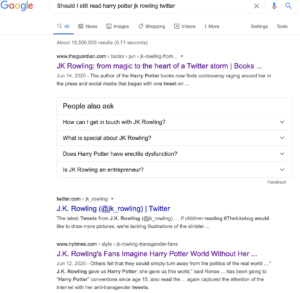About a year ago, the owner of two local bars made some racially insensitive comments on Twitter. As a result, I made the decision not to frequent his establishments anymore. The first of these, Ryleigh’s, was home to the Baltimore chapter of the US Tottenham supporters club, and as a self respecting Arsenal supporter, there was no way I was ever stepping foot in there. His second bar, Crossbar, is a German beerhall-style spot, serving huge liters of beer. Once the owner outed himself as a racist, downing liters at Crossbar was longer an option. That’s why it stopped me in my tracks this past weekend when a friend suggested we go there once the COVID-19 restrictions are lifted. It surprised me because this friend and I share many similar values and come down on the same side of many political debates. I got to thinking about whether my stance was actually hurting the owner, or myself.
With all of this in mind, for this exercise I wanted to find some writings about “cancel culture”. With the recent controversy surrounding J.K. Rowling’s comments about transpeople on Twitter, I took to Google to look for news articles offering perspectives. I experimented with the search terms, and typed in the following: “Should I still read harry potter jk rowling twitter“.

The first three results of my search were from The Guardian, the New York Times, and a link to Rowling’s Twitter feed itself. I read the Guardian and Times articles, ultimately settling on the one from the Times for my notes-taking exercise. Because I wanted to use a recent, news-worthy topic, I knew that Google would be the best tool for this particular job. However, I expect I’ll be using tools such as JSTOR to help me find a scholarly journal or article which will help me gain a historical perspective.
Rowling is clearly not the first person to be threatened with “cancellation”, and “cancel culture” is just the latest term for what is sometimes referred to as “consumer activism”. What I’m hoping to find are well-researched articles and papers – perhaps even a book or two – that focus on the effectiveness of consumer activism. How often have boycotts worked? Can they go too far?
I’d also like to find something that looks into whether it’s truly possible to separate the artist from the art. Should we all really stop listening to Michael Jackson? Should we not read Mark Twain? Should we stop watching films produced by Harvey Weinstein? What might be easy for some will not be as easy for others. I’m finding these questions intellectually stimulating, and am looking forward to getting some help in an attempt to answer them for myself.

